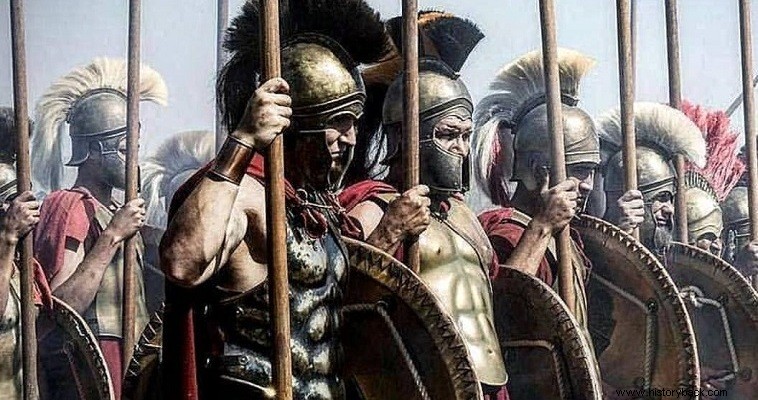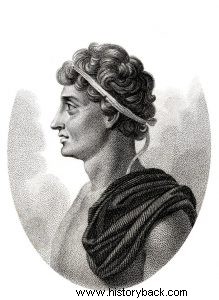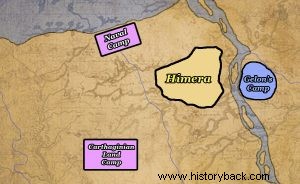
In 480 BC the very existence of metropolitan Greece was threatened by the invasion of the huge army of Xerxes. In Greater Greece (Lower Italy - Sicily), the existence of Hellenism was on the edge of a razor's edge by the attack of a huge Carthaginian army under Amilcas.
The Carthaginians controlled part of Sicily and controlled the city of Imera. The leader of the Syracusan Gelos wanted the expulsion of the Carthaginians from the island and in 483 BC. expelled the tyrant of Imera and an ally of the Carthaginians, Tirillus, who requested the intervention of the Carthaginians.
The opponents
Finally, three years late, the Carthaginian army arrived in Sicily. It was a mainly mercenary force that numbered, according to ancient sources, 300,000 men from Iberia, Sardinia, Italy, Gaul and of course Carthage and North Africa. This force was brought to the island by a formidable armada of 3,200 ships of any type.
The nucleus of this army was the African units of the Carthaginians who fought much like the Greek hoplites. The Iberians fought in a looser order, much like the Greek peltasts. The Sardinians, Celtiberians and Gauls were famous for their impetuosity, but not for their "weight" and cohesion. The Carthaginians had a lot of cavalry, heavy and light and heavy chariots.
On the other side the tyrant of Syracuse Gelos together with his father-in-law the tyrant of Acragantes Theron had a force of 55,000 men (50,000 infantry, 5,000 cavalry) consisting mainly of citizens - hoplites, but also of war-experienced Greek hoplites and Italian and Sicilian mercenaries, many of whom fought "peltastically".
The Carthaginians flood Sicily
Amilkas arrived in Sicily and landed his huge army at Panormo, today's Palermo. However, the passage to the island was difficult and most of the ships carrying the chariots and horses were lost. It was a bad omen and an event that proved decisive. Gelon had assembled about 200 ships but did not see fit to risk a collision with the Carthaginian fleet.
Immediately after the landing of his forces, Amilkas left his men for three days to recover from the hardships of the journey, and then following the coast road marched towards Imera with the fleet tracking his movement. Theron he was in the city with his forces. Attacked the enemies, but was defeated and closed in the walls.
The city was built on a hill about 100 m high on the west bank of the river Imera. The hill was steep except for its southern slope which was smooth. After surveying the area, Amilkas ordered the creation of a camp south of the city. The fleet anchored on the coast where another camp was set up fortified with fences and stakes.
Then a large number of Carthaginian ships set sail to bring supplies from Sardinia and Africa. Amilkas, however, did not completely exclude the city. Parts of his army savagely plundered the surrounding area. But in the meantime Gelon and his army had arrived and camped near the river.
The Greek cavalry even managed to kill and capture several opponents engaged in looting and foraging. Amilkas had no cavalry to face the Greeks. So he requested, in his letter, from the allies of Selinundius, to send him their horsemen.
However, the Carthaginian messenger was captured by the Greeks and the letter fell into the hands of Gelonus. Of course Gelon did not let such an opportunity go to waste. Knowing that his chances of defeating the huge Carthaginian army in a line-by-line battle were slim, he resorted to a stratagem...
Courage, spear and fire
Gelon decided to send his own horsemen to the Carthaginian camp who would pretend to be allies and at the right moment would set fire to the enemy ships. At the same time he would launch an attack with his infantry against the enemy camp south of the city. Gelon's plan worked exactly.
His horsemen moved in the evening and at dawn appeared before the Carthaginian camp on the beach. The guards were tricked and let the Greek horsemen in. The Greeks from Imera saw the horsemen entering the enemy camp and alerted Gelonas.
The Carthaginians, seeing Gelon's army approaching, left the camp and deployed for battle. Gelon, having confidence in his soldiers, immediately attacked. The battle was fierce with the Greeks being pressed by the numerical superiority of the warriors. At the critical moment, however, the cavalry intervened...
The Greek horsemen attacked the surprised Carthaginians in the coastal camp and after cutting them down, they set fire to the enemy ships and attacked the army of Amilcas who was fighting Gelona head on. It was the ultimate trap. With the flames rising from the burning ships and the Greeks attacking them with fanaticism front and flank, the Carthaginian army was disbanded. Every man was trying to save himself and all sense of cohesion and order was lost. Amilkas was killed by the Greek horsemen.
Herodotus mentions that the Carthaginian leader committed suicide when he saw the destruction of his army. Diodorus Sikeliotis and the other ancient sources, however, mention his death at the hands of the Greeks. The death of Amilca increased the panic.
The hard core of the Carthaginian army, the native and African troops together with the Iberians, however, temporarily reorganized and counter-attacked the Greeks, many of whom, thinking that the battle was over, looted the enemy camp. Then Theron saved the situation by making an exit, striking the enemies from the side and the rear.
Triumph
The Greeks set fire to the camp and many of the enemy were burned alive. Those opponents who were still fighting now definitively fled, some to the sea, seeking salvation in the ships that had not been burned and others to the surrounding hills.
Some escaped from the first, but none from the second, as the Greeks surrounded them and annihilated them. At least half the men of the Carthaginian army were killed or captured. According to the ancient sources of the Carthaginian ships that escaped and escaped, several were sunk by a storm.
The battle of Imera was one of the most important and catalytic of antiquity. The conflict between Greeks and Carthaginians was to last another three centuries, but the Greeks had already proved that they could fight one of the then superpowers of the Mediterranean. It is worth noting that in 2007-08 a mass grave of the dead of the battle was discovered in the area.

Gelon of Syracuse.

